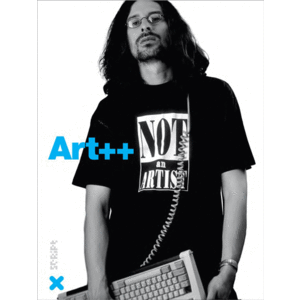“Programming is fun” Art++ book review
“Programming is fun” is what the artist and professor Douglas Edric Stanley declares in the book Art ++. This motto is not only an invitation to play but also the definition of the art-oriented programming.
Art++ is a recent published book that aims to demonstrate this statement. David-Olivier Lartigaud – professor in plastic art and art science at the University of Paris 1 Panthéon-Sorbonne and also member of the LAM (Laboratoire des arts et des medias) and of the CITU (Création interactive transdisciplinaire universtaire) –along with theorists and artists investigate the current state of net art and Software art.
This collective book was published as the result of an international conference (“Programmation orientée art”) on “the sense and use of computer programming in art” that was held in 2004 .
During the 1960s programming was still simple. The computer-scientist/artist was mostly experimenting the code universe. With the development of graphic design in the 1970s and especially in the 1980s, “image processing” became the number one interest. Nevertheless, with the invention of Perl language in 1987 we have experienced a regain of interest regarding the code. Perl poetry shows the need “to appropriate the software in a different way and more particularly to consider it as a piece of writing which has its own value”. One of the most popular examples is the Perl poem written in 2001 that transcribes William Blake’s 19th century poem “London” into program code. Thanks to Internet source code became more and more accessible through HTML (1989) and JavaScript (1995).
“This context gave birth to a new generation of artist, most of them self-taught in programming, who appropriated these script languages in a high-level, free and creative way. At the end of the 1990s, this art became a way to contrast with the use of already made software and stood as a symbol of freedom regarding the computer. Thanks to programming some artists could be master again of the machine and develop fully their ideas”
The article of Nathalie Magnan, (“Art, Hack, Hacktivisme, culture jamming, medias tactiques”) is one of the most interesting. It speaks about the art of hacking and describe how the hackers are criticizing the mass society. Hackers are revolutionaries.
The project “Pirates of the Amazon” was an interface design experiment conducted by the students of the Medias Design M.A. course at the Piet Zwart Institute of the Willem de Kooning Academy Hogeschool in Rotterdam. It’s a Firefox add-on that links (“Download 4 free”) to torrent files on The Pirate Bay for every digital product on Amazon. Obviously the people from the legal department of Amazon.com were quite unhappy with the artistic parody.
The book is divided in four chapters. The first one deals with the computer programming in art. Darko Fritz’s text gives historical details and presents the international artistic movement “Nove Tendencije”. The artist Antoine Schmitt (“Praxis de la programmation: reconsidérer “L’esthétique du code génératif”, pp. 77-87) referees to Geoff Cox, Adrian Ward and Alex McLean’s text (“The aesthetics of generative code”) and tries to demonstrate that the code is not only functional but also poetic. The second chapter is entirely dedicated to the Software art. The theorist Florian Cramer wrote a manifesto (“Dix hypotheses au sujet de l’art logiciel”, pp. 103-110) in which he defines what Software art must be in ten points. The third part is called “Games and code” (“Jeux et code”). The last one or “A culture of programming” (“Une culture de la programmation”) is basically a compilation of texts that analyses our digital reality or society through art.
About the book:
By gathering a selection of texts, original and/or hitherto unpublished in French, this book placed under the direction of David-Olivier Lartigaud, seeks to analyze and to understand this new approach to the question of computer /art through a unique look at contemporary thinking in this domain. Art ++ is the first title of Script, the collection dedicated to digital culture published by Éditions HYX. [from Editions Hyx]
Contributors : Inke Arns, Samuel Bianchini, Andreas Broeckmann, Christophe Bruno, Wendy Chun, Geoff Cox, Florian Cramer, Anne-Marie Duguet, Jean-Paul Fourmentraux, Darko Fritz, Matthew Fuller, Alexander Galloway, Olga Goriunova, Graham Harwood, Wilfried Hou Je Bek, Anne Laforet, David-Olivier Lartigaud, Geert Lovink, Nathalie Magnan, Alex McLean, Karen O’Rourke, Miller Puckette, Gilles Rouffineau, Antoine Schmitt, Nicolas Thély, Sylvie Tissot, Jo Walsh, Adrian Ward.
